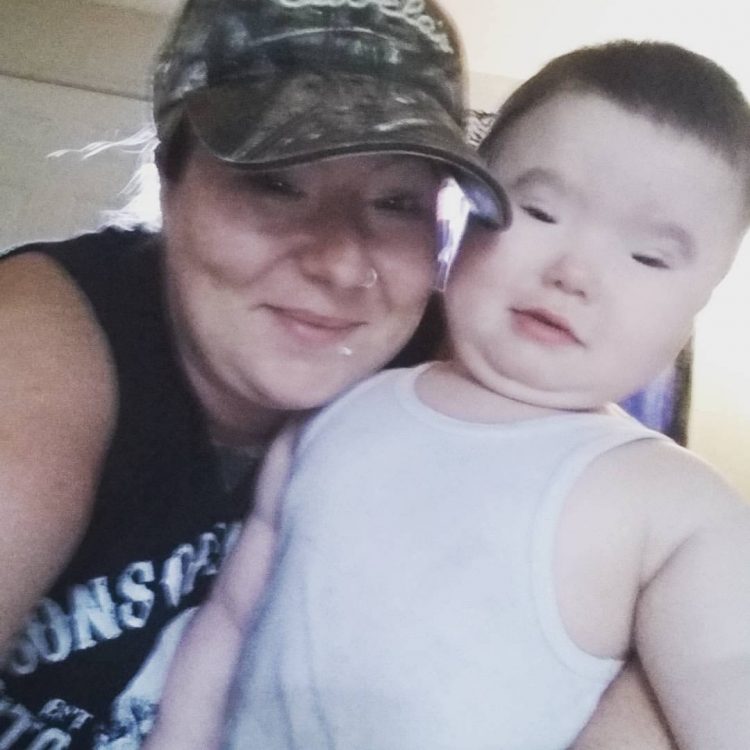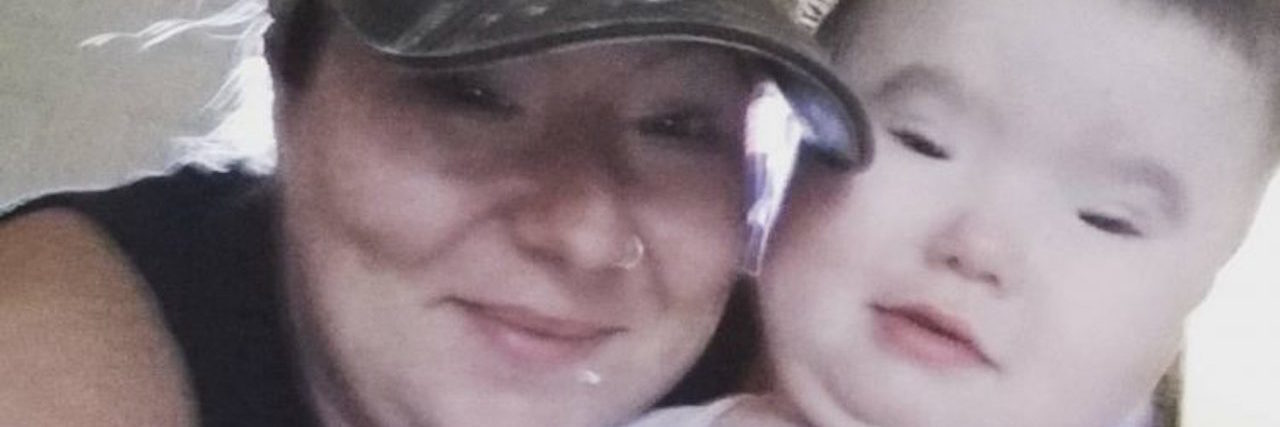In honor of Rare Disease Day on February 28th, I’d like to introduce you to one of the great loves of my life, my nephew Hunter, or as I affectionately call him, Shrimp.
Both Hunter and my sister Amy have a very rare genetic condition called blepharophimosis, ptosis, and epicanthus inversus syndrome (BPES). In fact, it is so rare, that statistics for the disease do not exist, according to the NIH. BPES is caused by a deletion of the FOXL2 gene, and causes narrowing of the eye opening (blepharophimosis), droopy eyelids (ptosis), and an upward fold of the skin of the lower eyelid near the inner corner of the eye (epicanthus inversus).
There are two types of BPES. Type 1 causes the atypical facial features associated with this condition, both the eye features mentioned above, an increased distance between the inner corners of the eyes (telecanthus), and a pretty nonexistent upper bridge of the nose, along with low-set ears, tear duct anomalies, and premature ovarian failure. Type 2 includes atypical facial features, but premature ovarian failure is absent. Both types can be associated with learning disorders and cognitive delays. Both Amy and Shrimp have undergone surgeries to try to correct the narrow eye openings to the best of medical science’s abilities, in order to widen their field of vision and increase their chances to live their best life.
Now that you know what BPES is, let’s talk about our experiences with it as a family. My sister is a proband, (the first person in our lineage to have the gene deletion, that we can find), and was relentlessly bullied and excluded all through her school years, solely because her eyes looked different. She was the only person in our modestly sized city with the condition. As I am seven years older than my sister, I did my best to protect her while we were at school together.
Unfortunately, when I graduated into high school, I could no longer protect her from the relentless bullying by her peers, all for the “crime” of looking different. This took place in the early 1990’s, when anti-bullying initiatives did not exist. This caused her to become hardened against others, she walked into any and every situation fully expecting ridicule. It took her many years and a lot of work to break down the wall she had isolated herself behind. To this day, she still struggles with debilitating self-esteem issues, and still must endure the stares and comments of the ignorant.
Despite all of this, what is my beautiful baby sister doing today? She is in college to become a personal support worker, so she can help those who may not be able to help themselves. She is a mother, and the best sister I could ever ask for. She is the first one to offer me assistance when I am in a tremendous amount of pain, and the one to assure me she’ll help care for me when my mobility is gone due to hypermobile Ehlers-Danlos syndrome.
Shrimp is 2 years old. He has no concept yet that he looks different. We, however, acutely feel that difference when he is out in public. There are people who stare and make comments. Heartbreakingly, some of the most horrible comments come from grown adults. I can’t count the number of people who recoiled from his stroller when he was an infant. I can’t count the times I’ve heard the word “freak” muttered under a passerby’s breath. People only seem to notice his eyes first.
Yet, Shrimp is so much more than BPES. He is incredibly handsome, and has a smile as wide as the moon. He has an infectious belly laugh and a love of books. He has an obsession with Thomas the Tank Engine and Paw Patrol, and an unbridled love of Stitch. He is always on the move and can charm the pants off of just about anyone. He loves little more than playing with his Uncle Mac — whose devotion is wholeheartedly returned in kind, and can run around with “TeeTee” for hours. OK, he runs, I hobble. I’ve even chased that him with a subluxed hip. The joy I get out of playing with him inspires me to push through the pain. Yes, I’ll pay for it later, and it will further affect my joints, but that is a price that I’d pay a thousand times over, just to see his face light up, and hear that laugh. He doesn’t care that TeeTee is sick. He doesn’t give a thought to the fact that I am rapidly becoming disabled. He doesn’t see me, his chronically ill aunt, as “less.” He sees me the same way I see him — as someone he loves — pure and simple. He is such an amazing little boy who brings immeasurable joy to each and every one of us. Everyone could have a taste of that joy, if they were able to look past his facial features, and just enjoy the beautiful, innocent soul within.
What do I want for Hunter? Everything. My little Shrimp deserves all the joy that he can wring out of life, but there is one thing that I want most of all. I want him to live in a world where he never needs to know that he looks different. I want him to live in a society where all people are recognized as beautiful and unique. I want him to never, ever, have to feel the pain and isolation my sister felt.
I know that there will always be cruel people out there, people who are cruel enough to make negative comments to a child. Still, I am certain, by taking the lessons we’ve learned through my sister’s experiences, and teaching Shrimp to disregard the haters, that he will overcome any obstacles and shine. A beautiful soul always does, one way or another.

We want to hear your story. Become a Mighty contributor here.

